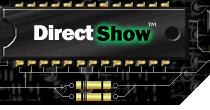



Index
Topic Contents
Previous Topic: IFilterInfo Object
Next Topic: IMediaEvent Object
 |
 | 
|

|
| |||
| |||
IMediaControl Object
The filter graph exposes the IMediaControl object to allow applications to control the streaming of media through the filters in the graph. The interface provides methods for running, pausing, and stopping the streaming of data. It also provides applications with a simple method that builds graphs to play back media files.
Properties
Name Description FilterCollection Retrieves a collection of IFilterInfo objects representing the current filters in the graph. RegFilterCollection Retrieves a collection of IRegFilterInfo objects representing the filters available in the registry. Methods
Name Description AddSourceFilter Adds to the graph the source filter that can read the given file name. GetState Retrieves the state of the filter graph. Pause Pauses all filters in the filter graph. RenderFile Adds and connects all filters needed to play the specified file. Run Switches the entire filter graph into run mode. Stop Switches all filters in the filter graph to a stopped state. IMediaControl Object
AddSourceFilter Method (IMediaControl Object)Adds the source filter that can read the given file name to the graph and returns the created IFilterInfo object.
objMediaControl.AddSourceFilter string, objFilterInfo
Parts
- objMediaControl
- Object expression that evaluates to an IMediaControl object.
- string
- Name of the file containing the source media.
- objFilterInfo
- IFilterInfo object; the source filter created for the specified source file.
IMediaControl Object
FilterCollection Property (IMediaControl Object)Retrieves a collection of IFilterInfo objects representing the filters in the graph. Returns an IAMCollection object.
Set objCollection = objMediaControl.FilterCollection
Parts
- objCollection
- IAMCollection object that represents the collection of filters currently present in the filter graph.
- objMediaControl
- Object expression that evaluates to an IMediaControl object.
IMediaControl Object
GetState Method (IMediaControl Object)Returns a Long integer indicating the current state value.
objMediaControl.GetState msTimeout, State
Parts
- objMediaControl
- Object expression that evaluates to an IMediaControl object.
- msTimeout
- Duration of the time-out, in milliseconds.
- State
- Long value that will contain the current state. This argument will be one of the following:
Value Description State_Paused The media source is paused. State_Running The media source is running. State_Stopped The media source is stopped. Return Values
Returns run-time error 567 if the state transition is not complete, or 0 if it completed successfully.
Remarks
Not all state transitions are synchronous. For example, even though the Pause method returns immediately, the graph typically does not complete the transition into paused mode until data is ready at the renderer. This method will not return zero until the state transition has been completed.
If you specify a nonzero time-out, the method waits up to that number of milliseconds for the graph to leave the intermediate state. If the time-out expires before the state transition is complete, the return code will be 567, and the returned state will be the state into which the graph is transitioning (either State_Stopped, State_Paused, or State_Running).
IMediaControl Object
RegFilterCollection Property (IMediaControl Object)Retrieves a collection of IRegFilterInfo objects representing the filters available in the registry.
Set objCollection = objMediaControl.RegFilterCollection
Parts
- objCollection
- IAMCollection object that contains IRegFilterInfo objects.
- objMediaControl
- Object expression that evaluates to an IMediaControl object.
Return Values
Returns an IAMCollection object.
IMediaControl Object
Pause Method (IMediaControl Object)Pauses all the filters in the filter graph.
objMediaControl.Pause
Parts
- objMediaControl
- Object expression that evaluates to an IMediaControl object.
Remarks
In the paused state, filters process data but do not render it. Data is pushed down the filter graph and is processed by transform filters as far as buffering permits. No data is rendered (except that media types capable of being rendered statically, such as video, have a static, poster frame rendered in paused mode). Therefore, putting a filter graph into a paused state cues the graph for immediate rendering when put into a running state.
IMediaControl Object
RenderFile Method (IMediaControl Object)Adds and connects filters needed to play the specified file.
objMediaControl.RenderFile string
Parts
- objMediaControl
- Object expression that evaluates to an IMediaControl object.
- string
- Name of the file to render.
Remarks
This method allows an application to pass the name of a media file that it wants rendered to the filter graph manager. The filter graph manager will build a graph of the filters that are needed to play back this file.
IMediaControl Object
Run Method (IMediaControl Object)Switches the entire filter graph into a running state.
objMediaControl.Run
Parts
- objMediaControl
- Object expression that evaluates to an IMediaControl object.
Remarks
If the filter graph is in the stopped state, this method first pauses the graph before running.
If an error value is returned, some filters within the graph might have successfully entered the running state. In a multistream graph, entire streams might be playing successfully. The application must determine whether to stop execution or not.
IMediaControl Object
Stop Method (IMediaControl Object)Switches all filters in the filter graph to a stopped state.
objMediaControl.Stop
Parts
- objMediaControl
- Object expression that evaluates to an IMediaControl object.
Remarks
In this mode, filters release resources and no data is processed. If the filters are in a running state, this method pauses them before stopping them. This allows video renderers to make a copy of the current frame for poster frame display while stopped.
© 1998 Microsoft Corporation. All rights reserved. Terms of Use.